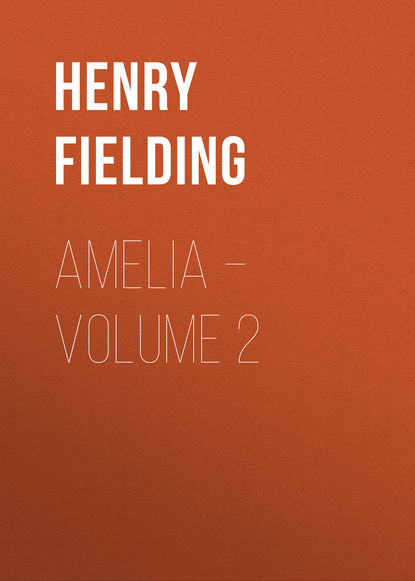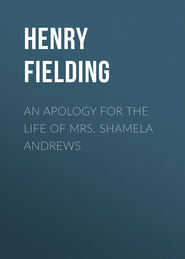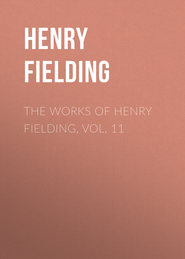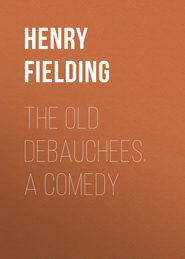По всем вопросам обращайтесь на: info@litportal.ru
(©) 2003-2024.
✖
Amelia – Volume 2
Настройки чтения
Размер шрифта
Высота строк
Поля
At these words Amelia turned pale as death, and hastily begged her friend to give her a glass of water, some air, or anything. Mrs. Bennet, having thrown open the window, and procured the water, which prevented Amelia from fainting, looked at her with much tenderness, and cried, "I do not wonder, my dear madam, that you are affected with my mentioning that fatal masquerade; since I firmly believe the same ruin was intended for you at the same place; the apprehension of which occasioned the letter I sent you this morning, and all the trial of your patience which I have made since."
Amelia gave her a tender embrace, with many expressions of the warmest gratitude; assured her she had pretty well recovered her spirits, and begged her to continue her story, which Mrs. Bennet then did. However, as our readers may likewise be glad to recover their spirits also, we shall here put an end to this chapter.
Chapter vii.
The story farther continued
Mrs. Bennet proceeded thus:
"I was at length prevailed on to accompany Mrs. Ellison to the masquerade. Here, I must confess, the pleasantness of the place, the variety of the dresses, and the novelty of the thing, gave me much delight, and raised my fancy to the highest pitch. As I was entirely void of all suspicion, my mind threw off all reserve, and pleasure only filled my thoughts. Innocence, it is true, possessed my heart; but it was innocence unguarded, intoxicated with foolish desires, and liable to every temptation. During the first two hours we had many trifling adventures not worth remembering. At length my lord joined us, and continued with me all the evening; and we danced several dances together.
"I need not, I believe, tell you, madam, how engaging his conversation is. I wish I could with truth say I was not pleased with it; or, at least, that I had a right to be pleased with it. But I will disguise nothing from you. I now began to discover that he had some affection for me, but he had already too firm a footing in my esteem to make the discovery shocking. I will – I will own the truth; I was delighted with perceiving a passion in him, which I was not unwilling to think he had had from the beginning, and to derive his having concealed it so long from his awe of my virtue, and his respect to my understanding. I assure you, madam, at the same time, my intentions were never to exceed the bounds of innocence. I was charmed with the delicacy of his passion; and, in the foolish thoughtless turn of mind in which I then was, I fancied I might give some very distant encouragement to such a passion in such a man with the utmost safety – that I might indulge my vanity and interest at once, without being guilty of the least injury.
"I know Mrs. Booth will condemn all these thoughts, and I condemn them no less myself; for it is now my stedfast opinion that the woman who gives up the least outwork of her virtue doth, in that very moment, betray the citadel.
"About two o'clock we returned home, and found a very handsome collation provided for us. I was asked to partake of it, and I did not, I could not refuse. I was not, however, entirely void of all suspicion, and I made many resolutions; one of which was, not to drink a drop more than my usual stint. This was, at the utmost, little more than half a pint of small punch.
"I adhered strictly to my quantity; but in the quality I am convinced I was deceived; for before I left the room I found my head giddy. What the villain gave me I know not; but, besides being intoxicated, I perceived effects from it which are not to be described.
"Here, madam, I must draw a curtain over the residue of that fatal night. Let it suffice that it involved me in the most dreadful ruin; a ruin to which I can truly say I never consented, and of which I was scarce conscious when the villanous man avowed it to my face in the morning.
"Thus I have deduced my story to the most horrid period; happy had I been had this been the period of my life, but I was reserved for greater miseries; but before I enter on them I will mention something very remarkable, with which I was now acquainted, and that will shew there was nothing of accident which had befallen me, but that all was the effect of a long, regular, premeditated design.
"You may remember, madam, I told you that we were recommended to Mrs. Ellison by the woman at whose house we had before lodged. This woman, it seems, was one of my lord's pimps, and had before introduced me to his lordship's notice.
"You are to know then, madam, that this villain, this lord, now confest to me that he had first seen me in the gallery at the oratorio, whither I had gone with tickets with which the woman where I first lodged had presented me, and which were, it seems, purchased by my lord. Here I first met the vile betrayer, who was disguised in a rug coat and a patch upon his face."
At these words Amelia cried, "O, gracious heavens!" and fell back in her chair. Mrs. Bennet, with proper applications, brought her back to life; and then Amelia acquainted her that she herself had first seen the same person in the same place, and in the same disguise. "O, Mrs. Bennet!" cried she, "how am I indebted to you! what words, what thanks, what actions can demonstrate the gratitude of my sentiments! I look upon you, and always shall look upon you, as my preserver from the brink of a precipice, from which I was falling into the same ruin which you have so generously, so kindly, and so nobly disclosed for my sake."
Here the two ladies compared notes; and it appeared that his lordship's behaviour at the oratorio had been alike to both; that he had made use of the very same words, the very same actions to Amelia, which he had practised over before on poor unfortunate Mrs. Bennet. It may, perhaps, be thought strange that neither of them could afterwards recollect him; but so it was. And, indeed, if we consider the force of disguise, the very short time that either of them was with him at this first interview, and the very little curiosity that must have been supposed in the minds of the ladies, together with the amusement in which they were then engaged, all wonder will, I apprehend, cease. Amelia, however, now declared she remembered his voice and features perfectly well, and was thoroughly satisfied he was the same person. She then accounted for his not having visited in the afternoon, according to his promise, from her declared resolutions to Mrs. Ellison not to see him. She now burst forth into some very satirical invectives against that lady, and declared she had the art, as well as the wickedness, of the devil himself.
Many congratulations now past from Mrs. Bennet to Amelia, which were returned with the most hearty acknowledgments from that lady. But, instead of filling our paper with these, we shall pursue Mrs. Bennet's story, which she resumed as we shall find in the next chapter.
Chapter viii.
Further continuation
"No sooner," said Mrs. Bennet, continuing her story, "was my lord departed, than Mrs. Ellison came to me. She behaved in such a manner, when she became acquainted with what had past, that, though I was at first satisfied of her guilt, she began to stagger my opinion, and at length prevailed upon me entirely to acquit her. She raved like a mad woman against my lord, swore he should not stay a moment in her house, and that she would never speak to him more. In short, had she been the most innocent woman in the world, she could not have spoke nor acted any otherwise, nor could she have vented more wrath and indignation against the betrayer.
"That part of her denunciation of vengeance which concerned my lord's leaving the house she vowed should be executed immediately; but then, seeming to recollect herself, she said, 'Consider, my dear child, it is for your sake alone I speak; will not such a proceeding give some suspicion to your husband?' I answered, that I valued not that; that I was resolved to inform my husband of all the moment I saw him; with many expressions of detestation of myself and an indifference for life and for everything else.
"Mrs. Ellison, however, found means to soothe me, and to satisfy me with my own innocence, a point in which, I believe, we are all easily convinced. In short, I was persuaded to acquit both myself and her, to lay the whole guilt upon my lord, and to resolve to conceal it from my husband.
"That whole day I confined myself to my chamber and saw no person but Mrs. Ellison. I was, indeed, ashamed to look any one in the face.
Happily for me, my lord went into the country without attempting to come near me, for I believe his sight would have driven me to madness.
"The next day I told Mrs. Ellison that I was resolved to leave her lodgings the moment my lord came to town; not on her account (for I really inclined to think her innocent), but on my lord's, whose face I was resolved, if possible, never more to behold. She told me I had no reason to quit her house on that score, for that my lord himself had left her lodgings that morning in resentment, she believed, of the abuses Which she had cast on him the day before.
"This confirmed me in the opinion of her innocence; nor hath she from that day to this, till my acquaintance with you, madam, done anything to forfeit my opinion. On the contrary, I owe her many good offices; amongst the rest, I have an annuity of one hundred and fifty pounds a- year from my lord, which I know was owing to her solicitations, for she is not void of generosity or good-nature; though by what I have lately seen, I am convinced she was the cause of my ruin, and hath endeavoured to lay the same snares for you.
"But to return to my melancholy story. My husband returned at the appointed time; and I met him with an agitation of mind not to be described. Perhaps the fatigue which he had undergone in his journey, and his dissatisfaction at his ill success, prevented his taking notice of what I feared was too visible. All his hopes were entirely frustrated; the clergyman had not received the bishop's letter, and as to my lord's he treated it with derision and contempt. Tired as he was, Mr. Bennet would not sit down till he had enquired for my lord, intending to go and pay his compliments. Poor man! he little suspected that he had deceived him, as I have since known, concerning the bishop; much less did he suspect any other injury. But the lord – the villain was gone out of town, so that he was forced to postpone all his gratitude.
"Mr. Bennet returned to town late on the Saturday night, nevertheless he performed his duty at church the next day, but I refused to go with him. This, I think, was the first refusal I was guilty of since our marriage; but I was become so miserable, that his presence, which had been the source of all my happiness, was become my bane. I will not say I hated to see him, but I can say I was ashamed, indeed afraid, to look him in the face. I was conscious of I knew not what – guilt I hope it cannot be called."
"I hope not, nay, I think not," cries Amelia.
"My husband," continued Mrs. Bennet, "perceived my dissatisfaction, and imputed it to his ill-success in the country. I was pleased with this self-delusion, and yet, when I fairly compute the agonies I suffered at his endeavours to comfort me on that head, I paid most severely for it. O, my dear Mrs. Booth! happy is the deceived party between true lovers, and wretched indeed is the author of the deceit!
"In this wretched condition I passed a whole week, the most miserable I think of my whole life, endeavouring to humour my husband's delusion and to conceal my own tortures; but I had reason to fear I could not succeed long, for on the Saturday night I perceived a visible alteration in his behaviour to me. He went to bed in an apparent ill- humour, turned sullenly from me, and if I offered at any endearments he gave me only peevish answers.
"After a restless turbulent night, he rose early on Sunday morning and walked down-stairs. I expected his return to breakfast, but was soon informed by the maid that he was gone forth, and that it was no more than seven o'clock. All this you may believe, madam, alarmed me. I saw plainly he had discovered the fatal secret, though by what means I could not divine. The state of my mind was very little short of madness. Sometimes I thought of running away from my injured husband, and sometimes of putting an end to my life.
"In the midst of such perturbations I spent the day. My husband returned in the evening. O, Heavens! can I describe what followed? – It is impossible! I shall sink under the relation. He entered the room with a face as white as a sheet, his lips trembling and his eyes red as coals of fire starting as it were from his head. – 'Molly,' cries he, throwing himself into his chair, 'are you well?' 'Good Heavens!' says I, 'what's the matter? – Indeed I can't say I am well.' 'No!' says he, starting from his chair, 'false monster, you have betrayed me, destroyed me, you have ruined your husband!' Then looking like a fury, he snatched off a large book from the table, and, with the malice of a madman, threw it at my head and knocked me down backwards. He then caught me up in his arms and kissed me with most extravagant tenderness; then, looking me stedfastly in the face for several moments, the tears gushed in a torrent from his eyes, and with his utmost violence he threw me again on the floor, kicked me, stamped upon me. I believe, indeed, his intent was to kill me, and I believe he thought he had accomplished it.
"I lay on the ground for some minutes, I believe, deprived of my senses. When I recovered myself I found my husband lying by my side on his face, and the blood running from him. It seems, when he thought he had despatched me, he ran his head with all his force against a chest of drawers which stood in the room, and gave himself a dreadful wound in his head.
"I can truly say I felt not the least resentment for the usage I had received; I thought I deserved it all; though, indeed, I little guessed what he had suffered from me. I now used the most earnest entreaties to him to compose himself; and endeavoured, with my feeble arms, to raise him from the ground. At length he broke from me, and, springing from the ground, flung himself into a chair, when, looking wildly at me, he cried – 'Go from me, Molly. I beseech you, leave me. I would not kill you.' – He then discovered to me – O Mrs. Booth! can you not guess it? – I was indeed polluted by the villain – I had infected my husband. – O heavens! why do I live to relate anything so horrid – I will not, I cannot yet survive it. I cannot forgive myself. Heaven cannot forgive me!"
Here she became inarticulate with the violence of her grief, and fell presently into such agonies, that the frighted Amelia began to call aloud for some assistance. Upon this a maid-servant came up, who, seeing her mistress in a violent convulsion fit, presently screamed out she was dead. Upon which one of the other sex made his appearance: and who should this be but the honest serjeant? whose countenance soon made it evident that, though a soldier, and a brave one too, he was not the least concerned of all the company on this occasion.
The reader, if he hath been acquainted with scenes of this kind, very well knows that Mrs. Bennet, in the usual time, returned again to the possession of her voice: the first use of which she made was to express her astonishment at the presence of the serjeant, and, with a frantic air, to enquire who he was.
The maid, concluding that her mistress was not yet returned to her senses, answered, "Why, 'tis my master, madam. Heaven preserve your senses, madam! – Lord, sir, my mistress must be very bad not to know you!"
What Atkinson thought at this instant, I will not say; but certain it is he looked not over-wise. He attempted twice to take hold of Mrs. Bennet's hand, but she withdrew it hastily, and presently after, rising up from her chair, she declared herself pretty well again, and desired Atkinson and the maid to withdraw. Both of whom presently obeyed: the serjeant appearing by his countenance to want comfort almost as much as the lady did to whose assistance he had been summoned,
It is a good maxim to trust a person entirely or not at all; for a secret is often innocently blabbed out by those who know but half of it. Certain it is that the maid's speech communicated a suspicion to the mind of Amelia which the behaviour of the serjeant did not tend to remove: what that is, the sagacious readers may likewise probably suggest to themselves; if not, they must wait our time for disclosing it. We shall now resume the history of Mrs. Bennet, who, after many apologies, proceeded to the matters in the next chapter.
Chapter ix.
The conclusion of Mrs. Bennet's history
"When I became sensible," cries Mrs. Bennet, "of the injury I had done my husband, I threw myself at his feet, and embracing his knees, while I bathed them with my tears, I begged a patient hearing, declaring, if he was not satisfied with what I should say, I would become a willing victim of his resentment, I said, and I said truly, that, if I owed my death that instant to his hands, I should have no other terrour but of the fatal consequence which it might produce to himself.
"He seemed a little pacified, and bid me say whatever I pleased.
"I then gave him a faithful relation of all that had happened. He heard me with great attention, and at the conclusion cried, with a deep sigh – 'O Molly! I believe it all. – You must have been betrayed as you tell me; you could not be guilty of such baseness, such cruelty, such ingratitude.' He then – O! it is impossible to describe his behaviour – he exprest such kindness, such tenderness, such concern for the manner in which he had used me – I cannot dwell on this scene – I shall relapse – you must excuse me."
Amelia begged her to omit anything which so affected her; and she proceeded thus: "My husband, who was more convinced than I was of Mrs. Ellison's guilt, declared he would not sleep that night in her house. He then went out to see for a lodging; he gave me all the money he had, and left me to pay her bill, and put up the cloaths, telling me, if I had not money enough, I might leave the cloaths as a pledge; but he vowed he could not answer for himself if he saw the face of Mrs. Ellison.
"Words cannot scarce express the behaviour of that artful woman, it was so kind and so generous. She said, she did not blame my husband's resentment, nor could she expect any other, but that he and all the world should censure her – that she hated her house almost as much as we did, and detested her cousin, if possible, more. In fine, she said I might leave my cloaths there that evening, but that she would send them to us the next morning; that she scorned the thought of detaining them; and as for the paultry debt, we might pay her whenever we pleased; for, to do her justice, with all her vices, she hath some good in her."
"Some good in her, indeed!" cried Amelia, with great indignation.
"We were scarce settled in our new lodgings," continued Mrs. Bennet, "when my husband began to complain of a pain in his inside. He told me he feared he had done himself some injury in his rage, and burst something within him. As to the odious – I cannot bear the thought, the great skill of his surgeon soon entirely cured him; but his other complaint, instead of yielding to any application, grew still worse and worse, nor ever ended till it brought him to his grave.
"O Mrs. Booth! could I have been certain that I had occasioned this, however innocently I had occasioned it, I could never have survived it; but the surgeon who opened him after his death assured me that he died of what they called a polypus in his heart, and that nothing which had happened on account of me was in the least the occasion of it.












